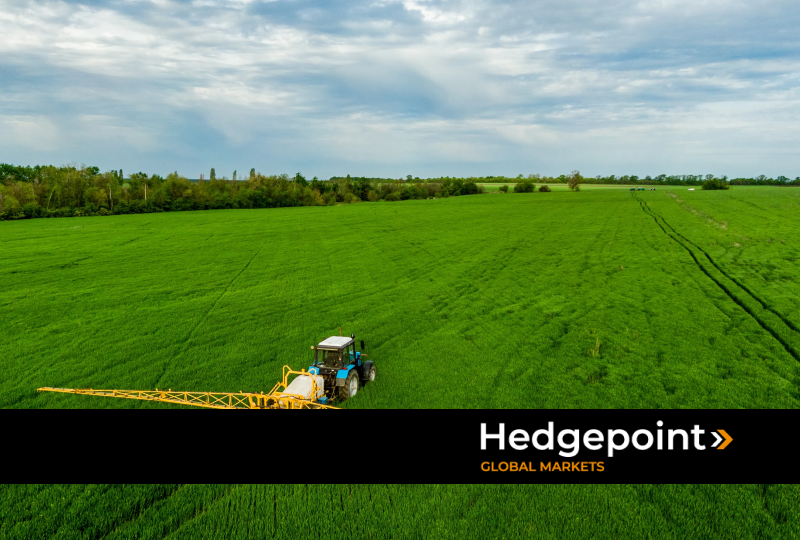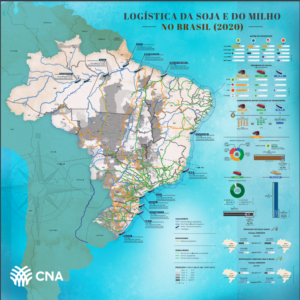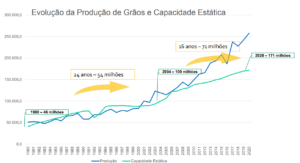
The price of oil is a determining factor in the economics of several production chains. As the most widely used fuel in the world, its volatility affects l

The price of oil is a determining factor in the economics of several production chains. As the most widely used fuel in the world, its volatility affects logistics costs
With this in mind, we invited expert Rodrigo Lamberti, grain risk management specialist at Hedgepoint, to explain the impact of oil prices on the agricultural market. We explore the impact of this variable on key issues for the sector, such as the return on investment for producers. Join our analysis and enjoy the read!
According to the expert, the price of oil has a direct impact on the costs of various agricultural sectors, with an emphasis on logistics costs such as freight and storage. Logistics costs have a direct impact on the “basis” or “premium” of an agricultural product. These terms represent the difference between the international exchange price of a commodity and its local market value.
Freight is one of the most important components in grain pricing. The higher the logistics costs, the lower the premium (basis) in that location and, therefore, the lower the amount the producer receives,” Lamberti says.
In Brazil, this impact on the premium can be even greater, given the predominance of road transport in the country. According to a study conducted by Esalq-LOG (Research and Extension Group in Agroindustrial Logistics) in collaboration with the USDA (United States Department of Agriculture), in 2019 trucks will be responsible for 69% of corn transportation in Brazil. For soybeans, this percentage was 67%.
Below, you can follow the road flow of grains in Brazil (in orange). The data was collected by the CNA (Brazilian Confederation of Agriculture and Livestock):

Source: CNA
According to the expert, “the dependence on road transportation makes the Brazilian agricultural sector more vulnerable to the price of oil through its derivative products, such as diesel”. This influence of fuel is also increased by the long distances traveled by trucks to transport grains. The material published by Esalq-LOG and the USDA highlights that the average delivery distance for soybeans and corn in Brazil is 574 miles or 923 kilometers
“During the harvest, the high demand for transportation also causes an increase in freight prices. This increase is another variable that has a direct impact on the margin of the agricultural producer,” adds the Hedgepoint expert. In addition, the concentration of deliveries also overloads the available fleet and further increases logistics costs.
Read also:
In addition to its direct impact on domestic road transportation, the price of oil also affects the price of internationally traded agricultural products. The expert points out that marine diesel, known as bunker fuel, is mostly made from oil. Any increase in prices affects the agricultural sector, as the amount of fuel consumed in this type of transportation is even greater.
“In addition, international conflicts can change logistical routes, significantly increasing the delivery distance. In these cases, freight becomes even more expensive,” says the expert
On the other hand, the rise in oil prices can also have a positive effect on some agricultural sectors. Currently, biodiesel production is on the rise, and biofuel itself is increasing its share in transportation, including bio-bunkers. .
According to Lamberti, because they are substitutes, the rise in the price of fossil fuels opens space for the growth in demand for biofuels produced from agricultural products, which in turn generates greater demand for soybean oil, corn and sugar cane, for example.
Also read:
Rodrigo Lamberti highlights the impact of grain storage on freight costs. The expert points out that Brazil has a storage capacity lower than its total grain production, which forces producers to sell their stocks quickly, even in unfavorable market conditions.
“The lack of storage often leads to significant quality losses, as grain stored on the ground is exposed to the weather. In addition, producers who have to pay for space or invest in their own warehouses face additional costs that affect their margins,” explains Lamberti.
Data published by Conab (National Supply Company) highlights this storage deficit. See below the latest information published by the institution:

Source: Conab
In 2024, the IBGE (Brazilian Institute of Geography and Statistics) published that the available capacity for grain storage in Brazil in the first half of the year was 5.4% higher than in the previous half. The website also points out that stocks increased by 15.5% compared to last year
Also read:
According to Lamberti, the market has adopted measures to overcome these costs, which are influenced by the long distances traveled by road. Although road transport still dominates, Brazil has made progress in diversifying its logistics. The use of rail, waterways and cabotage (maritime transport between national ports) are promising alternatives to reduce dependence on trucks.
“Innovations such as cabotage can make transportation more efficient and take advantage of Brazil’s maritime potential. The use of alternative fuels (such as bio-bunkers) is also a trend that can reduce dependence on oil,” says Lamberti.
The study by Esalq-LOG in collaboration with the USDA reports that the share of road transport in the flow of Brazilian grains will decrease by 8% from 2010 to 2019. With the reduction in road use, there was a 4% increase in the use of rail and a 4% increase in the use of river transport.
Also read:
Finally, the expert emphasizes that there are ways to protect farmers financially. Even if the premium (basis) remains exposed to local freight and storage conditions, the producer can use hedging to lock in the price of two other volatile components: the value of the commodity (grain) on the exchange and the exchange rate. .
At Hedgepoint, you can count on agricultural commodity hedging experts to put these products to work. Contact our team to learn more!
———————————————————————–

Rua Funchal, 418, 18º andar - Vila Olímpia São Paulo, SP, Brasil
Contato
(00) 99999-8888 example@mail.com
Section
Home
O que Fazemos
Mercado
Quem Somos
HUB
Blog
Esta página foi preparada pela Hedgepoint Schweiz AG e suas afiliadas (“Hedgepoint”) exclusivamente para fins informativos e instrutivos, sem o objetivo de estabelecer obrigações ou compromissos com terceiros, nem de promover uma oferta ou solicitação de oferta de venda ou compra de quaisquer valores mobiliários, commodity interests ou produtos de investimento.
A Hedgepoint e suas associadas renunciam expressamente a qualquer uso das informações contidas neste documento que direta ou indiretamente resulte em danos ou prejuízos de qualquer natureza. As informações são obtidas de fontes que acreditamos serem confiáveis, mas não garantimos a atualidade ou precisão dessas informações.
O trading de commodity interests, como futuros, opções e swaps, envolve um risco substancial de perda e pode não ser adequado para todos os investidores. Você deve considerar cuidadosamente se esse tipo de negociação é adequado para você, levando em conta sua situação financeira. O desempenho passado não é necessariamente indicativo de resultados futuros. Os clientes devem confiar em seu próprio julgamento independente e/ou consultores antes de realizar qualquer transação.
A Hedgepoint não fornece consultoria jurídica, tributária ou contábil, sendo de sua responsabilidade buscar essas orientações separadamente.
A Hedgepoint Schweiz AG está organizada, constituída e existente sob as leis da Suíça, é afiliada à ARIF, a Associação Romande des Intermédiaires Financiers, que é uma Organização de Autorregulação autorizada pela FINMA. A Hedgepoint Commodities LLC está organizada, constituída e existente sob as leis dos Estados Unidos, sendo autorizada e regulada pela Commodity Futures Trading Commission (CFTC) e é membro da National Futures Association (NFA), atuando como Introducing Broker e Commodity Trading Advisor. A Hedgepoint Global Markets Limited é regulada pela Dubai Financial Services Authority. O conteúdo é direcionado a Clientes Profissionais e não a Clientes de Varejo. A Hedgepoint Global Markets PTE. Ltd está organizada, constituída e existente sob as leis de Singapura, isenta de obter uma licença de serviços financeiros conforme o Segundo Anexo do Securities and Futures (Licensing and Conduct of Business) Act, pela Monetary Authority of Singapore (MAS). A Hedgepoint Global Markets DTVM Ltda. é autorizada e regulada no Brasil pelo Banco Central do Brasil (BCB) e pela Comissão de Valores Mobiliários (CVM). A Hedgepoint Serviços Ltda. está organizada, constituída e existente sob as leis do Brasil. A Hedgepoint Global Markets S.A. está organizada, constituída e existente sob as leis do Uruguai.
Em caso de dúvidas não resolvidas no primeiro contato com o atendimento ao cliente (client.services@hedgepointglobal.com), entre em contato com o canal de ouvidoria interna (ombudsman@hedgepointglobal.com – global ou ouvidoria@hedgepointglobal.com – apenas Brasil) ou ligue para 0800-8788408 (apenas Brasil).
Integridade, ética e transparência são valores que guiam nossa cultura. Para fortalecer ainda mais nossas práticas, a Hedgepoint possui um canal de denúncias para colaboradores e terceiros via e-mail ethicline@hedgepointglobal.com ou pelo formulário Ethic Line – Hedgepoint Global Markets.
Nota de segurança: Todos os contatos com clientes e parceiros são realizados exclusivamente por meio do nosso domínio @hedgepointglobal.com. Não aceite informações, boletos, extratos ou solicitações de outros domínios e preste atenção especial a variações em letras ou grafias, pois podem indicar uma situação fraudulenta.
“Hedgepoint” e o logotipo “Hedgepoint” são marcas de uso exclusivo da Hedgepoint e/ou de suas afiliadas. O uso ou reprodução é proibido, a menos que expressamente autorizado pela HedgePoint.
Além disso, o uso de outras marcas neste documento foi autorizado apenas para fins de identificação. Isso, portanto, não implica quaisquer direitos da HedgePoint sobre essas marcas ou implica endosso, associação ou aprovação pelos proprietários dessas marcas com a Hedgepoint ou suas afiliadas.
aA Hedgepoint Global Markets é correspondente cambial do Ebury Banco de Câmbio, de acordo com a resolução CMN Nº 4.935, DE 29 DE JULHO DE 2021, Artigo 14 do Banco Central do Brasil (BACEN).
Para mais informações sobre nosso parceiro, serviços disponíveis, atendimento e ouvidoria, acesse o link a seguir: https://br.ebury.com/